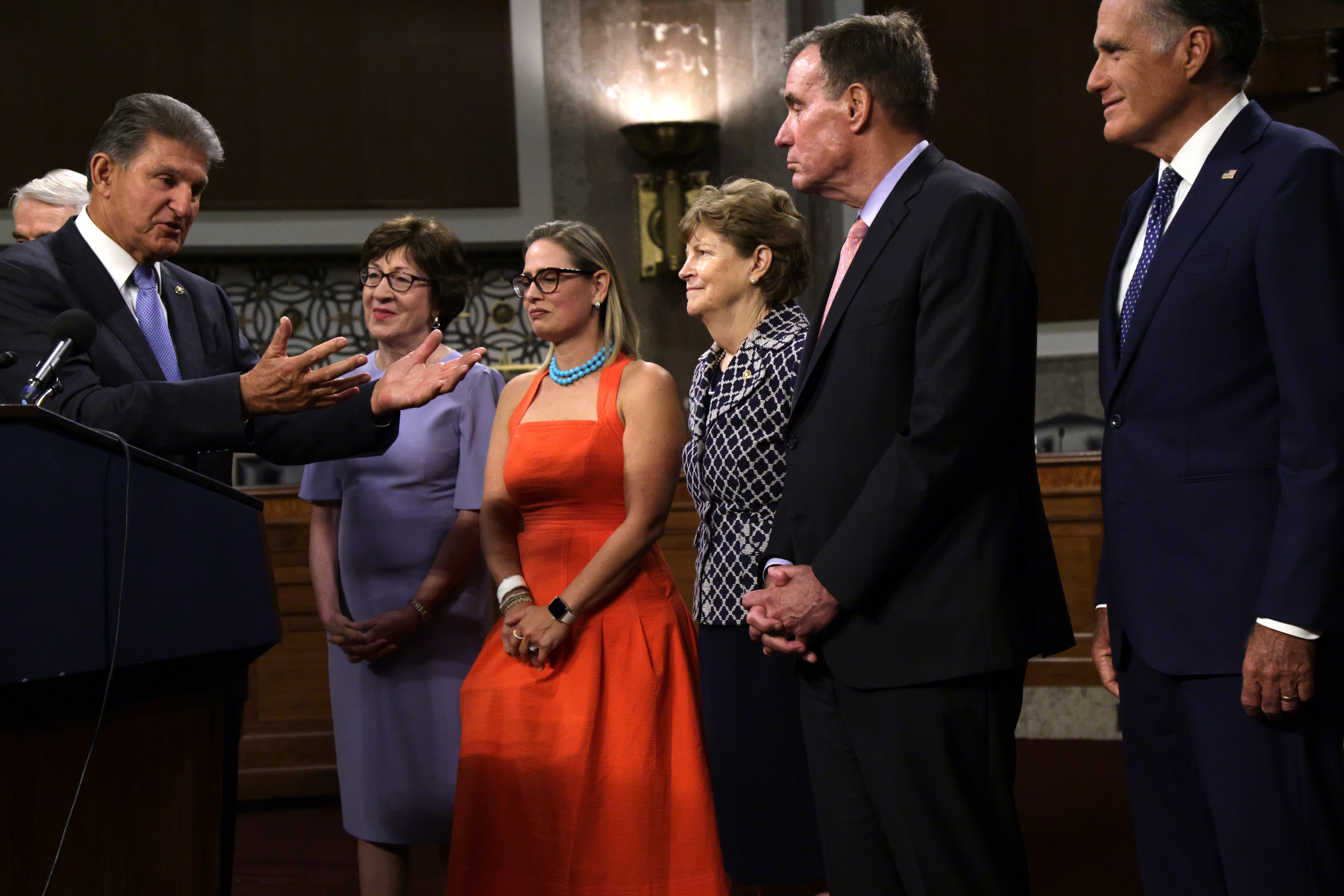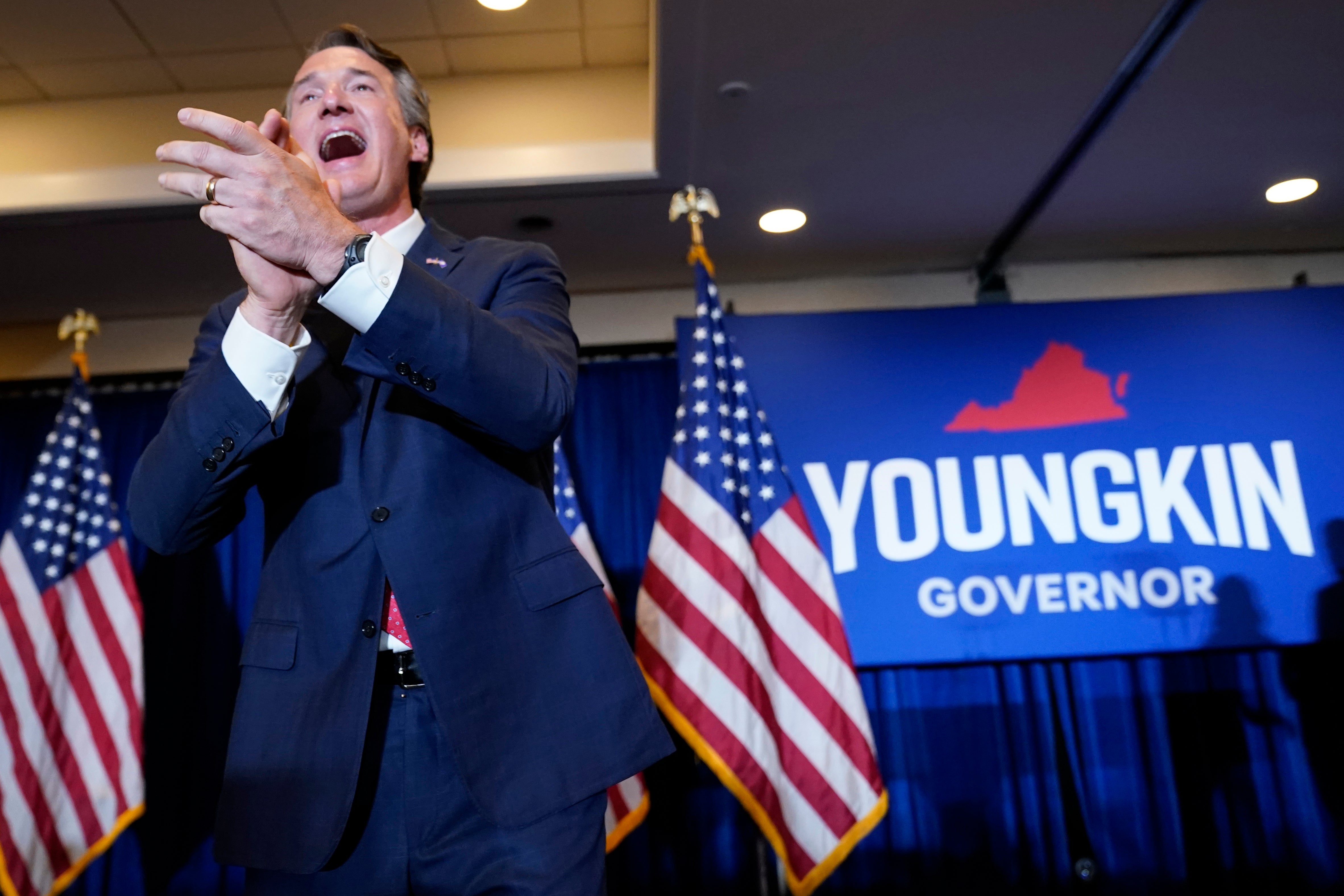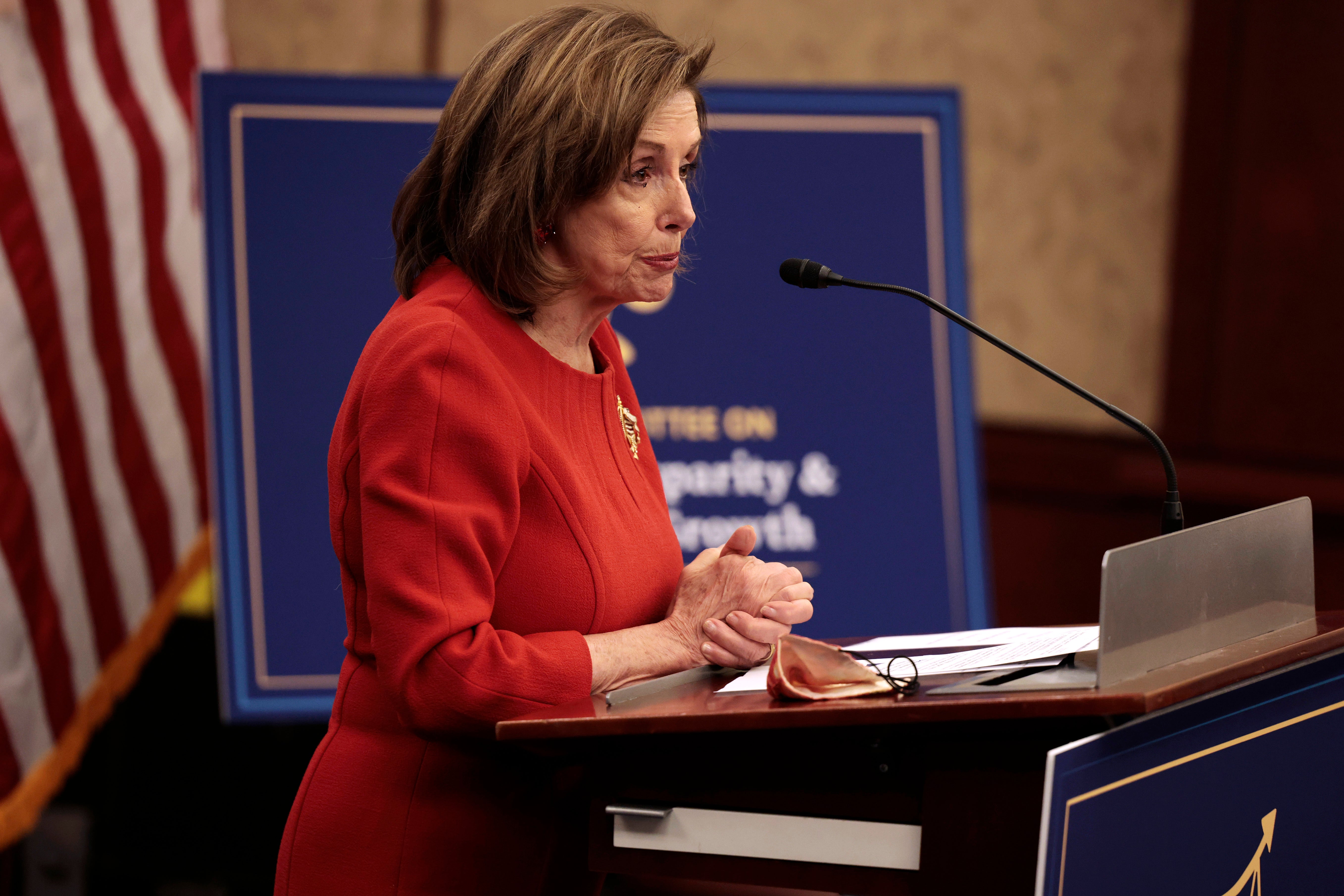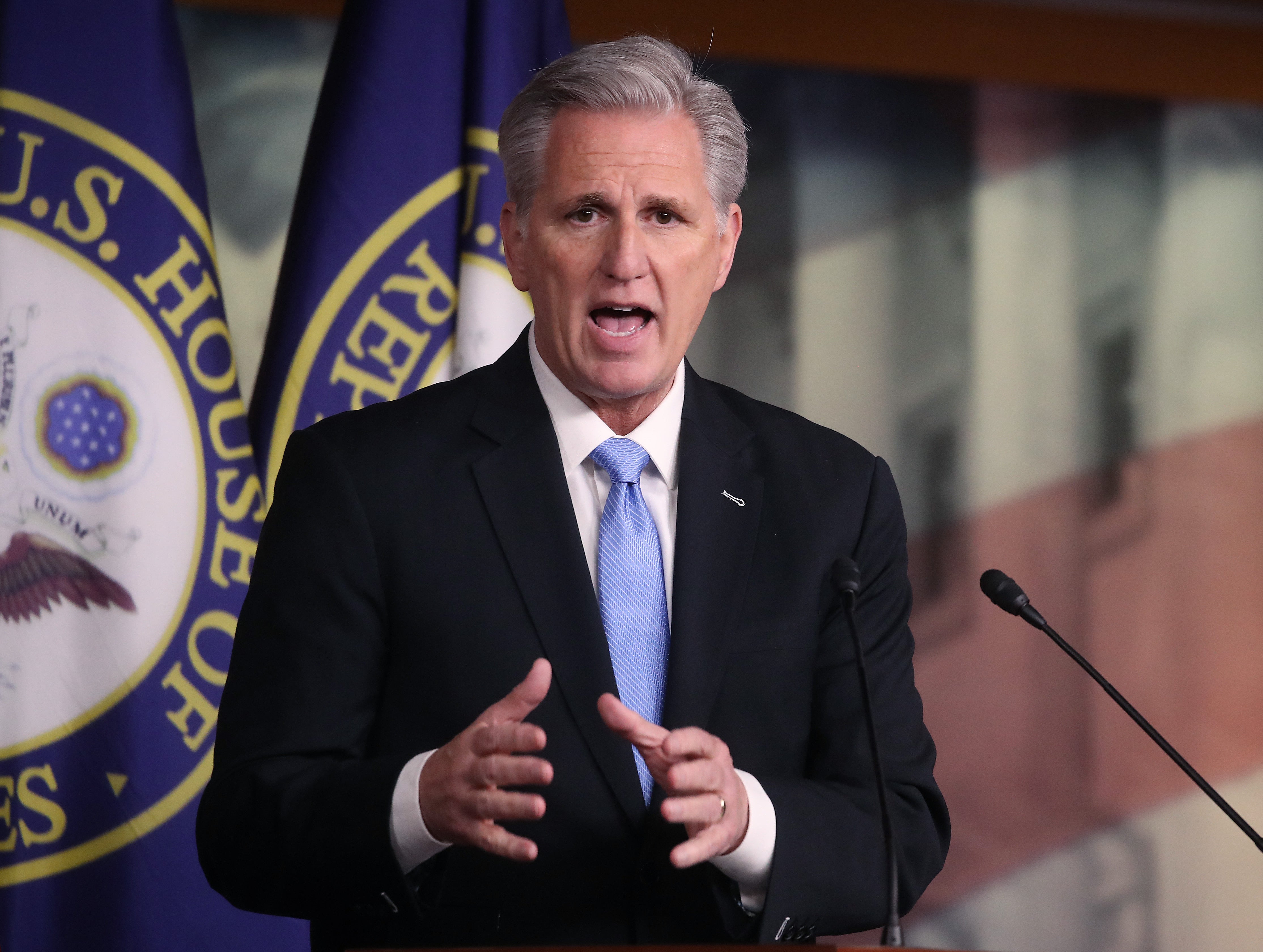From AOC to Joe Manchin, the winners and losers in a tumultuous 2021 in US politics
Joe Manchin, Kyrsten Sinema and Glenn Youngkin had some of their best years; Joe Biden, Kamala Harris and Kevin McCarthy less so. Eric Garcia gives his half-term report ahead of the 2022 midterms


As 2021 comes to a close, it is pretty clear that the year was a loss for many people. It began with a violent assault on the US Capitol in an attempt to subvert democracy as the president repeated lies about the election being stolen. That would set the tone for the rest of the poisonous year in politics. Similarly, the world entered its second full year in a pandemic and despite the emergence of a vaccine in record time, a large sliver of the country rebuffed calls to get immunised.
In turn, the year has ended much as it began, in a political morass and a country sharply divided along racial, political and socioeconomic lines. Similarly, some forces benefited while others paid for it. In the world of politics, where power is the main currency, some saw their fortunes rise while others fell.
Below is a list of people who gained and lost political capital after this last year, as well as groups of people whose results are to be determined. To be clear, this is not an endorsement of any politician’s ideas, policies or rhetorical style. It is merely to show who has gained power and influence and who has lost it to gauge how they will wield it in 2022. As the United States heads into the midterm elections next year, consider this your half-time report.

Winner: Senators Joe Manchin and Kyrsten Sinema
With one appearance on Fox News, Sen Joe Manchin of West Virginia killed President Joe Biden’s domestic agenda. It was the culmination of a year of Mr Manchin’s rising influence in Washington. One of the last Democrats to represent a rural, largely white working-class state, Mr Manchin became a power broker this year when Democrats won the Senate majority. As the rest of the party has become more liberal and ethnically heterogeneous, the former coal brokerage firm executive from a state with an overwhelmingly white population has the final say on everything from environmental legislation to voting rights. Similarly, Sen Sinema, despite being a former Green Party activist, has moved more to the centre and the White House has had to adjust accordingly. The Arizona Democrat first earned the ire of Democrats when earlier this year, she was seen giving a thumbs down to a $15 minimum wage while giving a curtsy to the person recording the vote.
In turn, Democrats must constantly placate their wishes. Mr Manchin’s objections were why they ultimately had to slash their proposed Build Back Better legislation from $6 trillion to $3.5 trillion to $1.75 trillion. He demanded that the House pass the bipartisan infrastructure bill he helped negotiate and pass in the Senate and it did while Ms Sinema’s opposition to any corporate or individual tax increases in Build Back Better effectively killed the prospects of raising revenue. And both of their opposition to ending the filibuster effectively kills voting rights as the Senate is currently set up despite frequent attacks on voting rights. When he effectively killed Mr Biden’s Build Back Better agenda, Democrats of all stripes, including the White House, cursed his name. But with an evenly divided Senate, there is little else they can do.

Loser: President Joe Biden
There is no doubt the president was sworn in during a tumultuous time. He took the oath of office on the balcony of the US Capitol two weeks after a deadly insurrection that his predecessor incited. He began his presidency, and his campaign, on a promise to “to restore the soul and to secure the future of America,” as he said in his inaugural address. He did indeed earn some early wins, passing the American Rescue Plan and later this year, signed a bipartisan infrastructure bill that had eluded previous presidents of both stripes. It looked like a vindication for a man who has long valued comity rather than sloganeering and partisan sniping and someone who prizes his personal relationships.
But now, the president faces stormy waters. The year ends with the coronavirus still raging and a new variant, omicron, tearing through the nation once more. Inflation is stubbornly high as Americans struggle with rising food and gas prices. The United States’s exit from Afghanistan ended with 13 American servicemembers dead. Now, after months of negotiations with Mr Manchin, the rest of his domestic agenda on everything from climate change to a sweeping anti-poverty child tax credit is effectively dead. A new poll from Marist, PBS Newshour and NPR found that 55 per cent of voters disapprove of the job he is doing. All of this indicates that Mr Biden would face a tough re-election if he decides to run in 2024 and could lose his majorities in the House and Senate.

Winners: Republican extremists
This one is a broader category. But as many establishment Republicans like Sens Rob Portman of Ohio, Roy Blunt of Missouri, Pat Toomey of Pennsylvania and Richard Burr of North Carolina announce their retirement, they will all likely be replaced by Trump toadies who have very little interest in governing and more interest in saying the most blatantly offensive things to get attention online. The latter two also were among the seven Republicans who voted on to convict former president Donald Trump after he incited a riot at the Capitol.
On the House side, it’s not much better. Members like Rep Marjorie Taylor Greene and Lauren Boebert have run roughshod over the party and faced few consequences. When Ms Taylor Greene, a QAnon conspiracy monger, was stripped of her committees, only eleven Republicans voted to do so. When Rep Lauren Boebert made blatantly Islamophobic comments, she faced no sanctions from the House GOP. Even when they opened fire on their own Republican members who are fairly conservative like Rep Nancy Mace, they faced little to no consequences or condemnation.

Loser: Vice President Kamala Harris
Vice President Kamala Harris entered office as a barrier breaker. She is the first woman vice president, the first African American to hold that office and the first Asian American. But since then, she’s received intense scrutiny. Part of this is the fact that the vice presidency is an inherently menial job whose power is always directly related to that of the presidency. At the same time, Ms Harris has made a series of unforced errors.
In fairness, she has been tasked with some difficult assignments. Mr Biden tapped her to lead on immigration and migrant children traveling to the US-Mexico border. But Ms Harris was criticised when she laughed off a question about why she hadn’t visited the border. Similarly, Mr Biden has charged Ms Harris with dealing with voting rights, but there is little the vice president can do on the subject as long as there is a deadlocked Senate and figures like Mr Manchin and Ms Sinema remain unmoved on changing the filibuster. Ms Harris has also faced plenty of stories about the negative morale in her office among staff. Plenty of Democrats now worry how she would perform in 2024 or 2028. All the while, a majority of voters disapprove of her performance as vice president.

Winner: Glenn Youngkin and the Virginia Republican Party
A year after Mr Biden carried the Old Dominion, Republicans in Virginia avoided the fate of the Florida Democratic Party or the California Republican Party by becoming a punching bag and perennial loser. By resorting to a nominating convention rather than a straight-up primary, the party staved off a candidate that would be radioactive to suburban moderates. They nominated former Carlyle executive Glenn Youngkin. In turn, Mr Youngkin figured out the right formula to balance appealing to hardline MAGA voters as well as more on the fence voters.
In short; Republicans figured out how to run on cultural grievances that animated the Trump era without the coarse rhetoric of MrTrump that offended so many would-be Democratic voters. They did this by largely harnessing suburbanite fears about “critical race theory,” a niche legal theory that has become a catch-all for teaching about racism in schools. This came as former Gov Terry McAuliffe ran largely on tying Mr Youngkin to Mr Trump. Republicans won back the governorship for the first time in a decade. Expect plenty of Republicans to run on similar themes throughout the country in the midterm elections.

Loser: House Speaker Nancy Pelosi
If this had been written a month ago, Ms Pelosi would have been seen as a winner. She got most of the progressive caucus to vote on the infrastructure bill before passing Build Back Better, despite saying repeatedly that the House would not vote on one without the other and struck a deal that got moderates to vote on Build Back Better a few weeks later. That should have opened the door for a detente between the various wings of the party.
Instead, Mr Manchin’s opposition to Build Back Better makes Ms Pelosi, along with all of the progressives who voted for the bipartisan bill without an ironclad commitment, look like they gave away all their leverage. It is true that they were caught in an impossible situation but Ms Pelosi likely knew this was a potential outcome when she gambled on the bipartisan bill. And she can’t say she wasn’t warned by the next winners on the list.

Winners: The Squad
On the day of the bipartisan bill’s vote, Reps Alexandria Ocasio-Cortez and Jamaal Bowman of New York, Ilhan Omar of Minnesota, Rashida Tlaib of Michigan, Ayanna Pressley of Massachusetts and Cori Bush of Missouri, who have become known as the Squad, were the only Democrats to oppose the legislation. At the time, Ms Omar, who is whip of the progressive caucus, told The Independent “It’s about making a promise on what you will do and sticking with it and that’s what I’ve done.” As it looked like Mr Manchin would likely kill the bill, Mr Bowman told The Independent “That’s what we’ve been saying for a very long time, and unfortunately it looks like they’re going to continue to kick the can down the road on BBB.”
Now Mr Manchin has proven the wisdom of the Squad’s fears. But the Squad also gained some smaller victories throughout the year. When the White House let an eviction moratorium for the pandemic lapse, they led a rally, sit-in and protest on the Hill steps, which led the Biden administration to take steps to extend it (though the Supreme Court allowed evictions to later resume). Similarly, when right-wing Rep Paul Gosar tweeted a doctored anime video of a character with his head killing a character with Ms Ocasio-Cortez’s face, the entire Democratic caucus came to her defence and voted to censure Mr Gosar.

Loser: House Minority Leader Kevin McCarthy
Mr McCarthy should be feeling quite confident right now. A record number of Democrats announce their retirement and different factions squabbling usually means he should be getting ready to assume the Speaker’s gavel. But instead, 2021 will be remembered as the year Mr McCarthy lost control of the House GOP caucus to the most radical and reactionary elements and allowed the moderates to embarrass him on multiple occasions.
On the day of the Capitol riot, Mr McCarthy reportedly called Mr Trump and asked him to call off the mob, only for the president to say “Well, Kevin, I guess these people are more upset about the election than you are.” Then Mr McCarthy said Mr Trump “bears responsibility” for the riot and called for a fact-finding commission, only to then vote against it. In turn, he failed to rein in the most extremist members of his caucus like Ms Greene and Ms Boebert while at the same time, allowing for major defections when it came to Mr Trump’s impeachment and the bipartisan infrastructure bill. Indeed, he seemed more concerned with grand gestures like when he gave an hours’ long speech to hold up Build Back Better that did nothing to stall its passage. Republicans may win the majority in 2022, but he is in no way guaranteed to be Speaker of the House.
Join our commenting forum
Join thought-provoking conversations, follow other Independent readers and see their replies
Comments
Bookmark popover
Removed from bookmarks